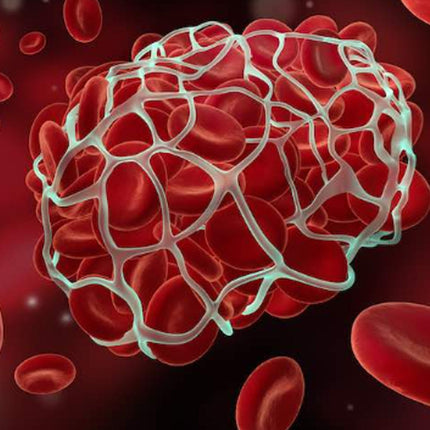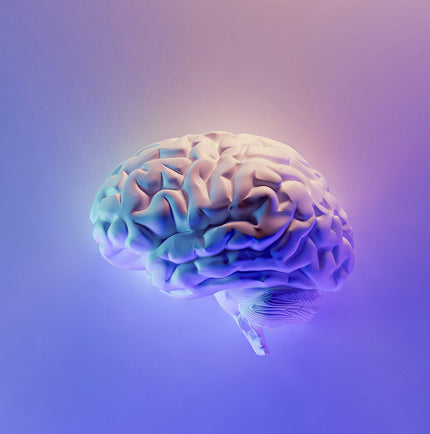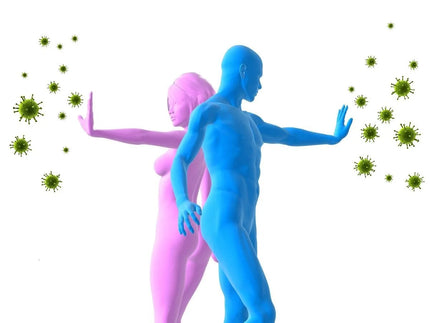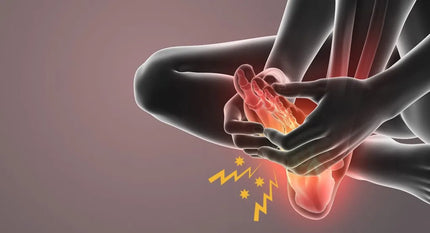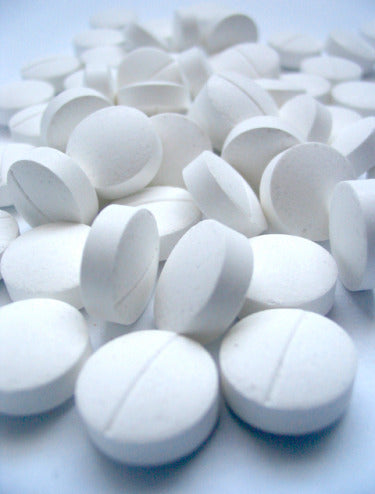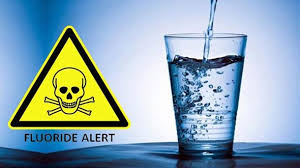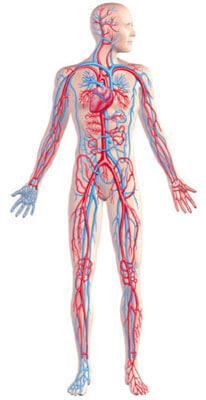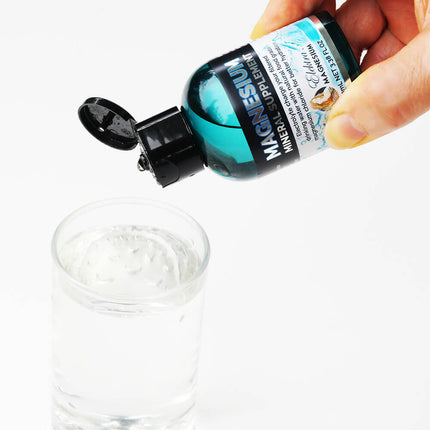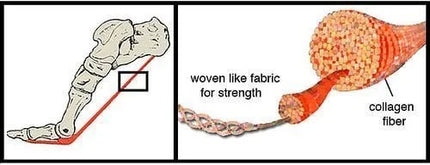Tax included and shipping calculated at checkout
Increasing your magnesium levels also supercharges the cleansing process. This is because magnesium supports detoxification by energising the detox enzymes such as glutathione and superoxide dismutase. These are powerful antioxidants, which neutralise free radicals and help to restore pH balance and energy production. This will give your metabolism a great boost - especially if you have been feeling sluggish and foggy, if the weight is piling on when it shouldn't be, or if you are battling with IBS and debilitating gut issues.
Why do we need to detox?
If you're living on planet earth right now, you're breathing in, ingesting and absorbing a range of toxins including air pollutants, heavy metals, fluorides, bisphenol A, estrogen-mimicking compounds and pesticides like glyphosate. You'll also be ingest toxins such as chlorine and fluoride just by drinking tap water.
When you ingest these toxins, some of them kill gut microbiota and this interferes with your digestion. Once your gut microbiome isn't working properly, a lot of your detoxing mechanisms are slowed down. These toxins also suppress your thyroid function and this slows your digestion system down.
If you think of your digestive system as a conveyor belt of food, the more sluggish it gets as the food moves along and decomposes, the more microbes move in to help it break down the food and this is when you get a lot of bloating and gas.

If this happens in the small intestine it's called SIBO (small intestine bacterial overgrowth). If the digestive issues become chronic, they can lead to ulcerative colitis, Crohn's disease or stomach ulcers from the overgrowth of bacteria. All of this makes it very hard to detox because your digestive tract is not functioning properly and it's one of the key areas for detoxification.
Our cells become overloaded with waste products
There's more to it as well. Several studies have shown glyphosate blocks the shikimate pathway in gut bacteria, as well as our own sulfate detoxification and antioxidant pathways. This means over time, our cells become overloaded with waste products, causing acidosis and disintegration - making detoxing so much harder.
This increased acidity in our cells slows down our metabolism because less oxygen is getting to our cells. It leads to conditions like chronic fatigue, fibromyalgia, diabetes and other metabolic diseases - even potenhtially triggering auto-immune reactions.
As well, when the mitochondria become overwhelmed by free radicals and acidosis because the garbage isn’t being taken out properly, they slow down production of ATP, and the cell walls start to inhibit the entry of insulin and blood sugar to make energy.
If too much blood sugar gets in, more acid byproducts ensue, which can be very destructive to mitochondria. This means instead of being used to make energy, the blood sugars end up going to the liver to be stored as fatty deposits.
The liver is your most important organ for detoxing

Your liver is your most important organ for detoxification. If it gets clogged and overloaded, the body usually produces excessive fat cells for waste storage so as to protect the vital organs. The resulting acidosis leads to metabolic syndrome, excessive weight gain, obesity, diabetes and cardiovascular disease. In some cases, if the acidic condition becomes very acute (as in cirrhosis of the liver), it can cause protein wastage, excessive loss of weight and eventually even cancer.
Why is fasting such a good way to detox?
Periodic fasting is a common tradition practiced in all cultures around the world for thousands of years - and for good reason. This is because fasting rests the digestive system and allows it to go through a more thorough 'self-cleaning' mode to restore digestion efficiency, as well as detoxification.
In recent years, the popularity of intermittent fasting has grown, especially with the 5:2 Diet made popular by journalist, Michael Mosley. Fasting has also become more popular because Irritable Bowel Syndrome (IBS), reflux (GERD) have become much more common syndromes. Medications may give some short term relief, but do not address the real problems, which are left to fester and become worse over time. Some medications such as antacids can actually exaccerbate stomach digestion problems.
There are a number of natural herbal remedies and teas that help to calm digestive disorders such as peppermint, chamomile, ginger and fennel, to name a few. However periodic fasting strategies are now gaining in popularity as a way to naturally manage the digestion, detox and elimination system without the unwanted side effects of medications.
Select the type of fasting which suits you

A wide range of herbal and vegetable liver detox programs incorporate fasting. On these types of fasts you typically ingest only strained vegetable juices and/or broths to provide nourishment for energy whilst resting the digestive system. There is a daily net deficit in calories so that you actually start to burn some stored fat (ketosis), but you feel full from the liquids until the next juice meal is due. As not much energy is spent in digesting food, it leaves you with more energy to spend elsewhere.
Some people prefer daily periodic fasting, which means they only eat in a 6 to 8-hour window of time during the day. They fast from the time they stop eating at night - until the time when they start eating again the next day. Others prefer to fast for a day a week, a few days each month, or even a couple of weeks a year.
The longer term fasts usually require some extra colonic irrigation (enemas) to help cleanse the bowel, as there's no fibre to assist the food moving through the body. Coffee enemas are quite popular to help alleviate detox headaches, and they trigger the liver to make more glutathione (which chelates and gets rid of toxins). For more information about how to do it effectively click here.
Studies on fasting, such as with Buchinger fasts, have shown that the change in pH towards more alkaline gut environment led to improvements in metabolism and blood sugar levels, weight loss, normalisation of blood pressure, as well as the remodelling of gut microbiome so that it reduced pathogens and attracted more beneficial bacteria.
Often people can need some extra help to get rid of pathogenic bacteria or candida overgrowth via the use of herbal or medicinal antibiotics. An experienced practitioner should be consulted if your symptoms are serious. This article is about the ongoing maintenance of the digestive system to keep it functioning optimally, so it can 'take out the garbage' efficiently. In this way we can defend against the progression of disease.
Increasing your magnesium levels will boost detoxification
As well as fasting for detoxification, it's important to boost your levels of magnesium at the same time. Many factors can lead to lower levels of magnesium including stress and poor diet, so many of us are low in magnesium. Consequently, your enzyme activity slows down, including the production of detoxification enzymes, such as glutathione or superoxide dismutase. These enzymes neutralise toxins, acids and free radicals to restore alkaline pH in cells. The whole elimination system can become sluggish when magnesium is low, which then leads to acidosis.
By using a magnesium cream moisturiser daily, as well as drinking ample magnesium mineral water (using food grade magnesium chloride) to help hydration, you'll be able to boost your magnesium levels and support detoxification.
Elektra Magnesium have a range of transdermal magnesium creams available, which have been developed using a special transdermal technology that can penetrate skin to be absorbed by the body, bypassing the digestive system. It can deliver much more magnesium faster than tablets or powders - and it's great for your skin too. While your gut is still repairing itself and recovering a better balanced muicrobiome, magnesium via skin can be the best way to boost your magnesium levels. And, it feels sooooo good!
Soaking in magnesium chloride will help to relax and recover
You can soak in magnesium chloride as well and this will help boost your magnesium levels. Elektra Magnesium has Magnesium Mineral Salt Flakes which you can put in your bath and soaking in this will boost your magnesium levels.
Soaking in magnesium salt flakes has been shown to help with detoxification because your skin is able to excrete toxins and waste products via bathing. This lightens the load on your kidney and liver. The uptake of elemental magnesium to the epidermis is usually around 300mg during the first 20-30 minutes of soaking in a magnesium chloride salt bath or foot soak. After that time absorption drops off as the body has had its fill, so you don't need to soak until you get like a prune!
Magnesium via skin also promotes a refreshing and restorative sleep. Better sleep means better recovery from stress. See our blog on Sleep here.
Add magnesium flakes to your drinking water to help the body cleanse
Another way you can boost your magnesium levels is to add magnesium flakes to filtered water - but remember they must be 'food grade' magnesium flakes if you're going to drink them.

There are quite a few brands of magnesium 'bath flakes' out there but they are industrial grade and not meant to be consumed. They could add to your problems if they have any heavy metal contaminants. So make sure you look at the packet and check if magnesium flakes are certified 'food grade' before you add them to your drinking water.
You can add Elektra Magnesium Chloride Flakes to filtered water and this will remineralise your water so it's more hydrating. The magnesium flakes also contain naturally-occuring sea trace minerals, which provide extra mineral balance and support.
One pinch (about half a gram) of these flakes per litre of filtered water makes a beautiful mineral water and adds about 80mg of elemental magnesium to your water. You can drink more water this way and you'll find you won't have to pee so often because the water travels through your body more slowly, thereby more thoroughly accessing the tissue cells, rather than quickly transiting the digestive system as de-mineralised water does.
Studies have found that drinking magnesium mineral water every day provides an equivalent amount of magnesium compared to a pharmaceutical supplement.
For more information about how to get more from your water, listen to this video-podcast: The Power of Magnesium in Drinking Water...
A healthy diet is extremely important for onging maintenance
All detoxification processes will work better when you're eating a healthy diet. That means, the bulk of your food should be comprised of vegetables, as this is what will bring in the water, fibre, vitamins and minerals that you need for proper transit of food through the digestive system. Veges and fruit already come packaged up naturally with enzymes that help digestion without requiring a lot of stomach acid in the process.
Vegetables act like a broom in the gut, sweeping and rinsing out the colon. They assist the digestion of the proteins and fats - especially the watery non-starchy vegetables. If you're eating nuts that are dense proteins, it is recommended to soak them overnight and rinse them the next day to activate them and make them easier to digest. If you're eating meat, try and eat a little less, and marinate it before cooking, as this will make it easier to digest. Avoid any kind of deep frying, as this produces toxic transfats. Soups are much easier to digest.

In summary: Fasting for Detox
In this blog we've explained how your digestive system needs to be working well so you can break down the food elements and absorb nutrients optimally. It also needs to take out the garbage efficiently. If motility slows down, producing a backlog in the digestive conveyor system, we can develop gut dysbiosis, IBS symptoms and metabolic problems. We've described the many types of fasting programs which will aid digestion - especially when you boost your magnesium level, which supports detoxification enzymes like glutathione.
Keep in mind that everyone is different and some people have a genetic predisposition for a more sensitive digestive system, while others seem to have a 'cast iron stomach' and can cope with junk (processed) food. Some people also need a lot more magnesium than others, but you can use whatever you like as far as magnesium via skin goes, because the body only absorbs as much as it can deal with at any one time. In other words, you can't 'overdose' that way.
What's for sure, is that as we grow older our digestive system gets more worn out and sensitive - no matter who we are. So if we want to live right into our senior years with plenty of energy and all our faculties in tact, you need to take good care of your digestive system, which supports the nervous system, energy production and brain function. It's better to avoid the onset of disease, rather than to have to deal with it later. Now you have some secret weapons and defences!
For more information from Elektra Magnesium on your gut microbiome, visit here.








